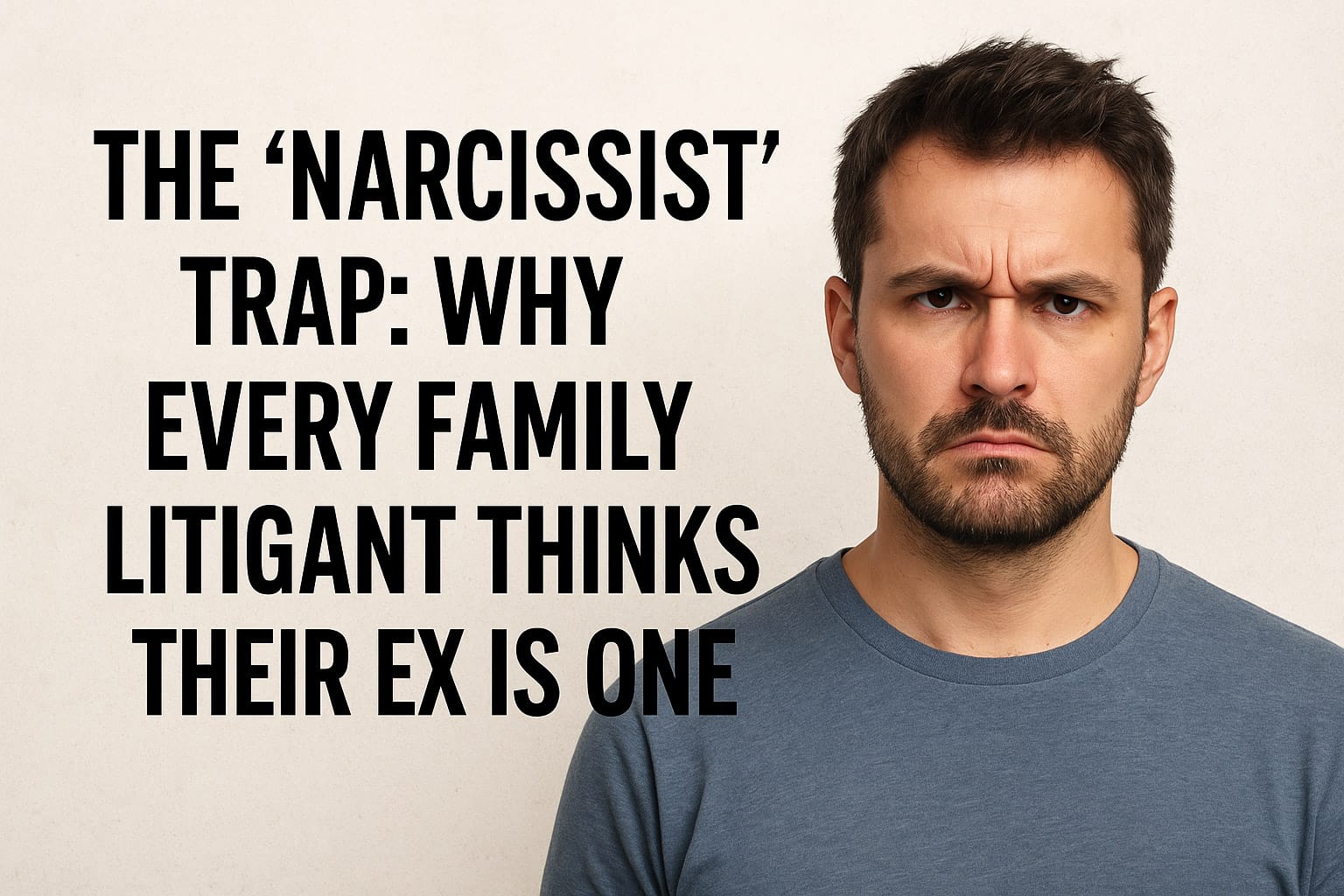In today’s family law practice, one trend has become unmistakable: almost every client who comes into the office believes their former spouse is a narcissist. Social media, self-help books, and popular psychology have made the term part of everyday vocabulary. While awareness of personality disorders can help some people understand toxic behavior, the casual use of “narcissist” in family law cases has created new challenges—both for clients and for lawyers. The same argument can be made for many other labels, including bi-polar, borderline personality disorder, ADD and others…
The Rise of the “Narcissist” Label
Ten years ago, clients rarely described their exes in clinical terms. Today, it seems nearly universal. Instagram, TikTok, and self-help podcasts have popularized traits associated with narcissism—entitlement, lack of empathy, or manipulativeness—turning them into a common shorthand for ex-spouses who are frustrating or uncooperative.
The problem is that the casual use of the term can oversimplify complex personalities. Not every controlling, rude, or stubborn ex qualifies as a narcissist. When clients adopt the label as a diagnostic tool, it can color their expectations, strategy, and even settlement decisions in ways that may not serve their best interests.
How Prevalent Is This in Court?
While there is no precise statistic, family law practitioners across jurisdictions report that references to “narcissistic exes” have become ubiquitous in pleadings, affidavits, and settlement discussions. Judges themselves are noticing it. A 2023 article in Family Law Quarterly noted that courts are increasingly confronted with litigants asserting narcissism as a central theme of their case, often based on social media advice rather than professional evaluation.
This trend is so widespread that judges and mediators have begun treating the label with caution, recognizing that it may reflect a client’s frustration rather than a clinical diagnosis. Overuse of the term can undermine credibility, particularly when uncorroborated by behavioral evidence or mental health assessment.
Why Jumping to “Narcissist” Can Hurt Your Client
As family lawyers, it is tempting to validate a client’s feelings—after all, high-conflict exes often display behavior that can be confusing or manipulative. But labeling an ex as a narcissist prematurely can have real consequences:
- Distorts Strategy and Expectations
When a client insists their ex is a narcissist, they may assume the other party will never compromise. This can make negotiation or mediation unnecessarily adversarial, prolonging litigation and escalating costs. - Encourages Emotional Reasoning Over Evidence
Social media provides checklists and “red flags” for narcissism, but these are often broad and anecdotal. Applying them to every difficult behavior risks clouding judgment and can cause clients to overreact to normal disagreements. - Weakens Credibility in Court
Judges and opposing counsel may view repeated assertions of narcissism as exaggerated or emotional. This can backfire if the lawyer relies on the label instead of objective evidence to make arguments about parenting, finances, or behavior. - Devalues Genuine Cases of Narcissistic Abuse
For those who have experienced clinically significant narcissistic abuse or personality disorders, the casual application of the term by every litigant diminishes the seriousness of the condition and the struggles of those genuinely affected.
Helping Clients Avoid the Trap
Lawyers play a critical role in guiding clients away from jumping to quick labels. Practical strategies include:
- Focus on Behavior, Not Diagnosis
- Encourage clients to document specific behaviors: missed visitations, refusal to cooperate, or controlling communication. Presenting factual evidence is far more persuasive than invoking a psychological label.
- Validate Feelings Without Labeling
It is important to acknowledge that a client’s frustration is real. Phrases like “I understand this behavior is challenging” maintain empathy without medicalizing the ex’s personality. - Educate About Overuse of Terms
Explain how overusing “narcissist” can reduce credibility and complicate negotiation. Many clients assume naming the condition makes their argument stronger, but judges look for patterns of behavior, not Instagram diagnoses. - Encourage Professional Evaluation When Needed
In rare cases, a mental health evaluation may be warranted—particularly if the behavior is extreme and affects parenting or safety. Encourage clients to rely on assessments from qualified psychologists rather than self-diagnosis or social media checklists. - Reframe the Narrative Around Goals
Shift the conversation from “proving the ex is a narcissist” to “achieving my client’s objectives in a realistic, evidence-based way.” This helps clients focus on custody arrangements, financial settlements, and practical outcomes instead of personality judgments.
A Cultural Phenomenon, not a Clinical Reality
The popularity of narcissism as a social media concept reflects a broader cultural shift. People now have access to language that can explain frustration, but this accessibility comes with risk. Self-diagnosis and labeling can feel empowering, yet in family law, empowerment must be grounded in reality and actionable evidence.
Lawyers, therefore, have a dual role: acknowledging client distress while maintaining objectivity. The former is essential for client trust; the latter is essential for successful advocacy.
While there isn’t a specific landmark case in New Jersey directly addressing the overuse of the term “narcissist” in family law proceedings, the courts have consistently emphasized the importance of evidence-based claims over generalized labels. For instance, in Doe v. Borough of Barrington, the court underscored the necessity of substantiating claims with factual evidence rather than relying on broad characterizations.
The New Jersey courts have recognized the complexities of personality disorders in family law contexts. In State v. Kelly, the Supreme Court of New Jersey acknowledged the relevance of expert testimony regarding “battered woman syndrome,” highlighting the court’s openness to understanding complex psychological conditions in legal proceedings.
Furthermore, New Jersey’s Prevention of Domestic Violence Act delineates specific criteria for establishing domestic violence, focusing on particular acts rather than broad personality assessments. This statutory framework reinforces the need for precise allegations supported by concrete evidence.
Conclusion
In modern family law, almost every litigant believes their ex has a severe personality disorder. While understandable, this trend can mislead clients, complicate negotiations, and weaken credibility in court. For lawyers, the challenge is to redirect emotional energy toward objective, actionable evidence—while validating feelings without reinforcing overused or inaccurate labels.
By focusing on behavior rather than diagnosis, we help clients protect their interests, maintain credibility, and achieve outcomes that truly matter—without turning every disagreement into a psychological battle.
Ultimately, guiding clients away from the “narcissist trap” preserves both the integrity of the legal process and the real meaning of the term for those who face genuine, clinically significant personality disorders.






